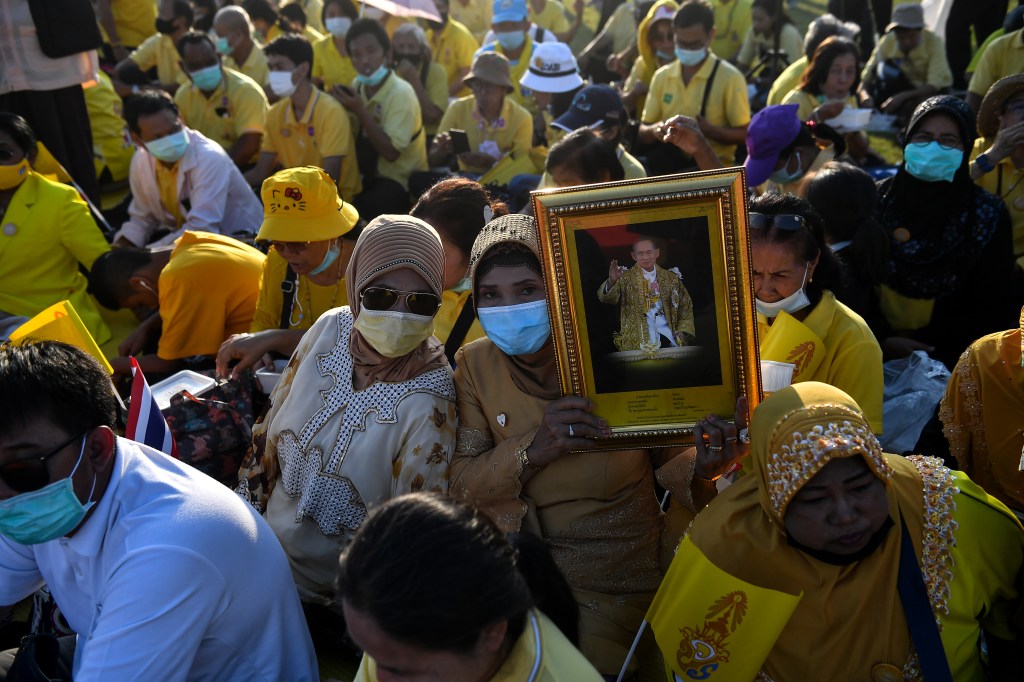A court sentenced a man to jail on Tuesday for selling cartoon rubber duck-themed calendars perceived to be insulting to Thailand’s revered royal family.
Prosecutors claimed that the cartoon ducks, dressed in military uniforms and other costumes typically worn by the king, were in violation of the country’s strict royal defamation laws designed to shield the monarchy from criticism.
Videos by VICE
Narathorn Chotmankongsin, who was convicted after a six-day trial, was arrested at his home in December 2020 and charged with lese-majeste for selling the duck-themed calendars on a pro-democracy Facebook Page.
Rubber ducks like the ones seen in the calendars have become a symbol of protest for Thailand’s anti-monarchy and pro-democracy movement since late 2020, when protestors used the inflatable birds to shield themselves against tear gas and water cannons fired by police.
Narathorn was initially sentenced to three years in jail, but that sentence was commuted to two years. The 26-year-old has been assisted by Thai Lawyers for Human Rights (TLHR), a group that provides free legal support for politically persecuted people.
Yaowalak Anuphan, Narathorn’s lawyer, told VICE World News that he merely helped to deliver the calendars, and did not produce or design them himself. But that didn’t stop the court from considering the act defamatory.
“This is part of a larger wave of recent [Section] 112 convictions, and we should expect more to come in the near future,” Yaowalak said.
Under Section 112 of Thailand’s Criminal Code, criticizing the monarchy is punishable with up to 15 years in prison. Experts say the controversial lese-majeste law, one of the world’s strictest, has been weaponized by authorities for decades to target anti-monarchy and pro-democracy activists.
Between November 2020 and June last year, authorities charged at least 215 people with lese-majeste, according to TLHR.
Sunai Phasuk, senior researcher on Thailand for Human Rights Watch, told VICE World News that authorities have been ramping up the use of the “draconian” law in recent years.
“The imprisonment of Narathorn shows that Thai authorities do not even tolerate anyone who pokes fun at the monarchy,” Sunai said. “A climate of fear is looming over Thai society, with choking effects on free speech and aspirations for democratic transition.”
Some have been indicted for even subtle jabs at the monarchy, including wearing a traditional pink dress interpreted by some as mocking the queen or parading in crop tops to mimic how the king occasionally dresses.
Others who engage in anti-monarchy discourse on social media are also at risk of prosecution. In 2021, a woman was sentenced to a record-breaking 87 years in jail—later halved to 43 years after she agreed to plead guilty—for sharing clips considered critical of the monarchy on social media.
But this heavy-handed response to anti-monarchy activists has only fuelled public anger at authorities.
Since Jan. 18, two prominent young activists’ have garnered national attention for choosing to go on a hunger strike in protest of the country’s justice system. Tantawan “Tawan” Tuatulanon and Orawan “Bam” Phuphong, who are 21 and 23 respectively, are demanding the release of political prisoners held in pre-trial detention and have called on political parties to help repeal Section 112.
Both of them were charged with royal defamation last year for conducting a public poll on royal motorcades, but the young activists deliberately revoked their bail in January before going on hunger strike. After over 40 days of refusing food, their health deteriorated quickly. They were rushed to the hospital over the weekend, where they are continuing to fast.
Pavin Chachavalpongpun, a Thai politics associate professor at Kyoto University in Japan, told VICE World News that the mounting arrests made under Section 112 have not dampened activists’ calls for monarchy reform.
“If they think that using [Section] 112 is working, they are so wrong,” said Pavin, a well-known critic of the Thai monarchy living in self-exile. “People are willing to talk about [the monarchy] despite the fact that they have to risk their lives.”
“The more they use the law, the more it’ll erode their position and reputation. In fact, it’s already eroding them.”







